It’s all about the mood. Films reviewed: Bob Marley: One Love, The Taste of Things
Hi, this is Daniel Garber at the Movies for culturalmining.com and CIUT 89.5 FM.
Many film critics — including myself — say that the most important part of a movie is the story. But that’s not always true. This week, I’m looking at two new movies where it’s all about the vibe, all about the mood, not the plot. There’s a cook cooking in 19th century France, and a musician making music in 1970s Jamaica.
 Bob Marley: One Love
Bob Marley: One Love
Dir: Reinaldo Marcus Green
It’s 1976, in Kingston Jamaica. Bob Marley (Kingsley Ben-Adir) and the Wailers are riding high with a string of worldwide hits. But the city is in turmoil, rocked by gang violence in the run up to a crucial election. US guns are flooding into the country. Bob Marley plans a “Smile Jamaica” concert to bring peace and lessen the tension between supporters of the leftist PM Manning and the pro-American conservative candidate Seaga. Bob — known as Skipper to his friends — is Rastafari, an anti-colonialist, afrocentric religion calling for a return to Africa from Babylon. But just days before the concert, Bob, Rita Marley (Lashana Lynch), and others were shot and wounded in a planned assassination attempt, with cars full of armed gang members invading their compound to stop them from singing. The concert goes through as planned, but they are forced to move to London for safety.
There, they put together their next album, Exodus, and embark on a tour of Europe, to be followed by a triumphant trip to Africa, Bob Marley’s dream. The album is a  huge hit, and his fame grows. But there’s trouble brewing between Bob and Rita, who have known each other since they were kids. They also face financial questions — are they being cheated out of their money by backroom management? And a wound to his foot from a soccer game isn’t healing like it should. Can Bob and Rita work out their problems? Will they ever make it to Africa? And can Bob Marley and the Wailers return to Jamaica and live in peace?
huge hit, and his fame grows. But there’s trouble brewing between Bob and Rita, who have known each other since they were kids. They also face financial questions — are they being cheated out of their money by backroom management? And a wound to his foot from a soccer game isn’t healing like it should. Can Bob and Rita work out their problems? Will they ever make it to Africa? And can Bob Marley and the Wailers return to Jamaica and live in peace?
Bob Marley: One Love is the long-awaited biopic about the musician and his life. Aside from a few flashbacks to his childhood and his start as a musician, the film focuses on two years of his life in the 1970s. So we see the musicians playing, in studio and at stadium concerts, hanging out in nightclubs and concert halls, or writing new songs at home. We also see them smoking spliffs (a Rastafarian sacrament) and playing soccer or fussball in their off hours. But what we don’t get much of is Bob Marley’s inner thoughts, his love life, his heart and soul. This is a common problem in hagiographic biopics that are approved every step off the way by his family.
 Bob Marley is sanctified, but not humanized — there seems to be a glass wall separating the audience from the character. At the same time, there are some fascinating revelations about his past, and interesting glimpses into the workings of Jamaican music scene (mainly through flashbacks). So we get to see Scratch Perry in studio, and the Wailers grooving on stage. The script is not great, it drags a bit, but photography is quite pretty, and the acting (largely played by British actors speaking Jamaican patois) is believable. Most important of all is the music, which sets the vibe that keeps the film moving all the way to the finish.
Bob Marley is sanctified, but not humanized — there seems to be a glass wall separating the audience from the character. At the same time, there are some fascinating revelations about his past, and interesting glimpses into the workings of Jamaican music scene (mainly through flashbacks). So we get to see Scratch Perry in studio, and the Wailers grooving on stage. The script is not great, it drags a bit, but photography is quite pretty, and the acting (largely played by British actors speaking Jamaican patois) is believable. Most important of all is the music, which sets the vibe that keeps the film moving all the way to the finish.
It’s the music that makes Bob Marley: One Love worth seeing.
 The Taste of Things (La passion de Dodin Bouffant)
The Taste of Things (La passion de Dodin Bouffant)
Co-Wri/Dir: Tran Anh Hung
It’s the late 19th century, in France. Eugenie (Juliette Binoche) is an haut cuisine cook at a chateau, surrounded by a lush vegetable garden. She’s preparing an elaborate meal for Dodin (Benoît Magimel) and his fellow gourmets. She’s assisted by Violette, the maid, and supervised by Dodin. And what a meal it is, with each dish requiring multiple stages, and dozens of steps. Even something as simple as consommé is actually a complex, refined broth known for its subtle flavours. We follow each step, from picking vegetables in the garden, to sautéing the meat, simmering it, and removing the scum.
This day, there’s a new face in the kitchen, Violette’s young niece. Pauline (Bonnie Chagneau-Ravoire) has a preternatural ability to taste all the elements of a dish, despite not yet developing a refined palate. Perhaps she’ll become Eugenie’s apprentice some day? In the meantime Eugenie takes pains to hide her occasional dizzy spells.
After 20 years, Dodin and Eugenie have an unusual relationship; they work together,  effortlessly in the kitchen, like a well oiled machine. And at night, if she chooses to do so, Eugenie leaves her chamber unlocked so Dodin can spend the night.
effortlessly in the kitchen, like a well oiled machine. And at night, if she chooses to do so, Eugenie leaves her chamber unlocked so Dodin can spend the night.
But it’s hard to tell if they are lovers, boss and worker, or husband and wife (with all that entails). What future dishes will they prepare? And will they ever tie the knot?
The Taste of Things is a mouth-watering look at 19th century French cooking. It’s nominally about a relationship, but not really. There’s also a visit to dine with a wealthy prince, and a look at strange new gardening techniques. But the plot is unimportant. As I watched this movie, I wasn’t thinking about why Eugenie has dizzy spells, or trying to keep track of Didot’s gourmet friends. It’s inconsequential.
It’s the food that’s important, the cooking and the eating. I was kept drooling for two hours, trying to guess what they’re making. Oh, that’s vol au vent! What’s with the meringue? Is it Baked Alaska? (a.k.a. omelette à la norvégienne). I was mentally  cooking alongside the burbling, burnished copper pots on the wood-burning stove. And the eating is remarkable, too, including a scene where the gourmets cover their heads with white napkins as they consume a tiny songbird (known as ortalans) whole.
cooking alongside the burbling, burnished copper pots on the wood-burning stove. And the eating is remarkable, too, including a scene where the gourmets cover their heads with white napkins as they consume a tiny songbird (known as ortalans) whole.
Certainly, Binoche and Magimel have chemistry — apparently they were once a couple in real life — but not enough to carry the movie. It’s the food — and the mood — that makes watching it worthwhile.
Bob Marley: One Love and The Taste of Things are both playing now in Toronto; check your local listings.
This is Daniel Garber at the Movies, each Saturday morning, on CIUT 89.5 FM and on my website culturalmining.com.
Famous men. Films reviewed: Anselm, Ferrari, The Iron Claw
Hi, this is Daniel Garber at the Movies for culturalmining.com and CIUT 89.5 FM.
The end of the year is coming up, so it’s a good time to reflect on what we’ve done over the past year — or even longer. It’s also useful to look at what famous people did, and whether you would have made the same mistakes — and accomplishments — that they did. So this week, I’m looking at three new movies — two biopics and a documentary — about famous men from very different backgrounds. There’s a family of pro wrestlers who carry a curse; an Italian industrialist who buries a family secret; and a German painter who digs up unpleasant things from his country’s past.
 Anselm
Anselm
Dir: Wim Wenders
Anselm Kiefer is an artist born into a bombed-out Germany just as WWII was ending. His paintings reflect this, using living, natural media, like wood, grass, leaves, ash and liquified metals. He creates much of his work in isolated factories and warehouses in places like Odenwald, a forest in Germany. He uses the spaces both as a studios and as a source of materials for his work. He resurrects controversial themes once co-opted by the Nazis — like Germanic heroes, nordic gods and Wagnerian winged valkyries— in order to confront a part of his country’s history most of his colleagues were trying to ignore. Especially controversial are a series of photos of himself posing in a Heil Hitler salute in cities across Europe. In fact, though, much of his work focuses on Germany’s history, specifically the Holocaust, featuring quotes from poet Paul Celan. Other paintings show blackened sunflowers beneath cold grey skies, or haunting rows of white sticks. Quite unnerving.
Anselm is a documentary by Wim Wenders that shows him at  work making his art. It’s filmed in a format more often used in superhero movies. I’m talking 3-D here — very unusual for an art film. And, along with the big screen, it gives you a sense of the grandeur of his paintings, which you just don’t get looking at them on your phone or computer screen. They are huge. He creates his work using enormous blowtorches attached to rubber hoses, bulldozers, forklifts and cast iron vats of liquid metals. He works in buildings so big you’d expect them to be smelting steel or building airplanes not painting canvases. There are also some very cool techniques that only seem accessible in the form of film. For example he uses slide and video projections of his work superimposed on an outdoor cloth screen stretched between trees in a forest beneath a dark, starry sky. It also uses actors — played by his and Wim Wenders own family members — to reenact Keifer’s history and the inspirations of many of his themes, including self-portraits of him lying on his back looking at the sky.
work making his art. It’s filmed in a format more often used in superhero movies. I’m talking 3-D here — very unusual for an art film. And, along with the big screen, it gives you a sense of the grandeur of his paintings, which you just don’t get looking at them on your phone or computer screen. They are huge. He creates his work using enormous blowtorches attached to rubber hoses, bulldozers, forklifts and cast iron vats of liquid metals. He works in buildings so big you’d expect them to be smelting steel or building airplanes not painting canvases. There are also some very cool techniques that only seem accessible in the form of film. For example he uses slide and video projections of his work superimposed on an outdoor cloth screen stretched between trees in a forest beneath a dark, starry sky. It also uses actors — played by his and Wim Wenders own family members — to reenact Keifer’s history and the inspirations of many of his themes, including self-portraits of him lying on his back looking at the sky.
 To be honest, I had heard of Kiefer and probably seen a painting or two, but knew little about him before this doc. Embarrassingly I even confused his work with that of Gerhard Richter (who also paints large canvases, at times semi-abstract, with references to Germany’s past, as in this fictionalized story of his life). Not any more. Kiefer is as dark and foreboding as Richter is bright and colourful. Now I can say I know a lot about Anselm Kiefer and his art. Is he my favourite artist? No, not by a long shot, but the doc makes his work more interesting and accessible, and now I’d like to see more of it in person. So if you’re into contemporary European art, or a fan of Wim Wenders, you should see Anselm.
To be honest, I had heard of Kiefer and probably seen a painting or two, but knew little about him before this doc. Embarrassingly I even confused his work with that of Gerhard Richter (who also paints large canvases, at times semi-abstract, with references to Germany’s past, as in this fictionalized story of his life). Not any more. Kiefer is as dark and foreboding as Richter is bright and colourful. Now I can say I know a lot about Anselm Kiefer and his art. Is he my favourite artist? No, not by a long shot, but the doc makes his work more interesting and accessible, and now I’d like to see more of it in person. So if you’re into contemporary European art, or a fan of Wim Wenders, you should see Anselm.
 Ferrari
Ferrari
Dir: Michael Mann
Enzo Ferrari (Adam Driver) is an automobile industrialist with a passion for race cars in Modena, Italy in the 1950s. It’s a typical morning: he kisses his wife Lina (Shailene Woodley) and says goodbye to his son as he drives away from their isolated villa into town. He has a meeting planned with a new racing car driver for the company’s team. Less typical is the reception he gets when he arrives at his city home and a woman pulls out a gun and shoots him. Laura Ferrari (Penélope Cruz) — is his actual wife! Luckily the bullet misses, but their relationship is clearly not doing well. Their son died and the business is on the rocks. She controls half of Ferrari — they founded the company together with Enzo doing the engineering and Laura handling the business side.
Ferrari makes their money by selling hand-made sportscars to very rich people around the world. And to keep their reputation, they also race. If Ferrari’s team wins, the company’s value goes up and more people buy their cars. But they’re also Enzo’s passion. And though Modena may be a small city, it’s where Italian race cars are made — Not just Ferrari but Maserati, De Tomaso, Lamborghini — they’re all built in or around there. Can Ferrari win the upcoming race? Can the company survive on its own or will they be taken over by a bigger, foreign corporation? Will Enzo ever admit he has a lover and a son? And will his relationship with Laura ever turn back to normal?
very rich people around the world. And to keep their reputation, they also race. If Ferrari’s team wins, the company’s value goes up and more people buy their cars. But they’re also Enzo’s passion. And though Modena may be a small city, it’s where Italian race cars are made — Not just Ferrari but Maserati, De Tomaso, Lamborghini — they’re all built in or around there. Can Ferrari win the upcoming race? Can the company survive on its own or will they be taken over by a bigger, foreign corporation? Will Enzo ever admit he has a lover and a son? And will his relationship with Laura ever turn back to normal?
Ferrari is a biopic about the founder of the famed Italian car company, his family and his racing cars. It has some nice locations and authentic looking costumes and sets. Other than that I can’t think of many good things to say about it. This movie is a real clunker. It’s a corny, melodramatic story filled with stiff dialogue and acting or the occasional overacting by people like Penelope Cruz. The non-italian actors all speak  with terrible fake accents. It’s directed by Michael Mann, the notorious 80s TV director who brought us shows like Miami Vice — never known their deep emotions.
with terrible fake accents. It’s directed by Michael Mann, the notorious 80s TV director who brought us shows like Miami Vice — never known their deep emotions.
And what’s with Adam Driver? Does he think putting on a suit and hat is enough to turn you into an Italian CEO? He made House of Gucci just two years ago and now he’s Ferrari. While Gucci was total kitsch, at least it was memorable and (unintentionally) funny. But this one is just a bore.
 The Iron Claw
The Iron Claw
Wri/Dir: Sean Durkin
It’s the late 1970s in Denton, Texas, near Dallas-Fort Worth.
The von Erich family is known for its athletic prowess in the world of pro-wrestling for two generations. Their Dad, Fritz, runs the Dallas Sportatorium. He and his wife Doris have four sons, all very close: Kevin (Zac Efron) is following his dad into the world of pro wresting, and adopting his signature move — the Iron Claw of the title. He’s a heavyweight wrestler, big and vascular, and wants to win the coveted heavyweight belt. But he’s shy and tongue-tied whether inside or out of the ring. Kerry (Jeremy Allen White) is on the US Track & Field Olympic team in training for the upcoming games in Moscow. David (Harris Dickinson) is a pro wrestler, too, tag-teaming alongside his brother. He’s not a heavyweight like Kev, but he’s agile, bright, and great at trash talking to the crowds. And Mike (Stanley Simons) the youngest one, is staying away from wrestling altogether, turning instead to music — he’s the lead singer in a band.
Their lives are lived under the close watch and heavy hand of
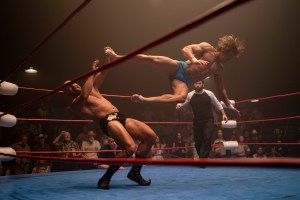
This image released by A24 shows Zac Efron, right, in a scene from “The Iron Claw.” (Brian Roedel/A24 via AP)
their father, a hard-ass manager and coach. Winning is everything. Their mom won’t get involved in family disputes — it’s for the boys to work it out. But Fritz is relentless, forcing his sons to do things they don’t really want to do. It’s a rough and hostile world. And hanging over everyone is the von Erich curse. This is because their oldest brother died in a terrible accident when he was just a boy. Kevin finally meets a woman, Pam (Lily James) and the family continues to be close as they pursue their futures as a team. But a dark cloud seems to be holding them all back. Can the brothers survive the harsh world of pro wrestling and the toxic atmosphere created by their father? Or will they succumb to the von Erich curse?
 The Iron Claw is a great drama based on the lives of the actual von Erich family. It’s tense, exciting, and emotionally draining. The wrestling scenes are shot in extreme close-up, bringing you right into the ring. Zac Efron (The Greatest Beer Run Ever, At Any Price, Baywatch) plays it strong and dumb, looking like he’s OD-ed on steroids and botox. Jeremy Allen White (he’s the star of the TV show The Bear) is intense and angry. Harris Dickinson (Beach Rats, Triangle of Sadness, Scrapper) plays a tragicomic character, and newcomer Stanley Simons is a naive innocent kid, totally unsuited for the ring. This is an honest look at the good and bad side of the sport and what a famous wrestling family went through. (Surprised it’s not about the Hart family, but that would be a different movie.)
The Iron Claw is a great drama based on the lives of the actual von Erich family. It’s tense, exciting, and emotionally draining. The wrestling scenes are shot in extreme close-up, bringing you right into the ring. Zac Efron (The Greatest Beer Run Ever, At Any Price, Baywatch) plays it strong and dumb, looking like he’s OD-ed on steroids and botox. Jeremy Allen White (he’s the star of the TV show The Bear) is intense and angry. Harris Dickinson (Beach Rats, Triangle of Sadness, Scrapper) plays a tragicomic character, and newcomer Stanley Simons is a naive innocent kid, totally unsuited for the ring. This is an honest look at the good and bad side of the sport and what a famous wrestling family went through. (Surprised it’s not about the Hart family, but that would be a different movie.)
I went into this film expecting a cheesy biopic, but it had me bawling in my seat by the end. The Iron Claw is a terrific tear-jerker.
Anselm is opening at the TIFF Bell Lightbox this weekend, with The Iron Claw and Ferrari also playing this weekend in Toronto; check your local listings.
This is Daniel Garber at the Movies, each Saturday morning, on CIUT 89.5 FM and on my website, culturalmining.com.
My, my. Films reviewed: My Animal, Maestro
Hi, this is Daniel Garber at the Movies for culturalmining.com and CIUT 89.5 FM.
This week, I’m looking at two new films opening this weekend — a horror movie from Canada and a biopic from the US. There’s a young conductor with his eyes on Carnegie Hall, and a young werewolf with her eyes on a figure skater at the hockey rink.
 My Animal
My Animal
Dir: Jacqueline Castel
Wri: Jae Matthews
It’s a cold day in the 1980s somewhere in Northern Ontario. Heather (Bobbi Salvör Menuez) is a young woman with blood-red hair. She reads women’s bodybuilding magazines on the sly and watches female pro-wrestlers late at night on TV. She’s athletic herself — works part-time at the arena’s snack bar — and hopes to join the local hockey team as goalie. Heather lives in the outskirts of town with her grizzled dad who runs a diner (Stephen McHattie), her angry, alcoholic mom (Heidi von Palleske) and the twins Cooper and Hardy (Charles and Harrison Halpenny). She and her little brothers inherited red hair from their mom and an unusual trait from their Dad. That’s why their mom keeps everyone shackled to their beds whenever there’s a full moon. Can’t have them  running around unwatched after midnight — they might bite someone! Yup… they’re werewolves.
running around unwatched after midnight — they might bite someone! Yup… they’re werewolves.
Everyone knows everyone in this town, so when a new face appears at the rink, Heather takes notice. Jonny (Amandla Stenberg) is a beautiful, young, pro figure skater. She’s kept under tight control by her effeminate father (who is also her ice-dance-partner) and her domineering baseball-player boyfriend (Cory Lipman).
But when Heather meets Jonny, they both sense something electric between them. They start going out late at night to parties and adventures, like dropping acid at the casino with their friend Otto (Joe Apollonio). Heather says she wants to show Jonny new things — if she’s not too scared to try. Are they just friends? Or something more? Will Jonny accept Heather’s shape-shifting… never mind her sexuality? Or will Heather’s late-night risk-taking lead to violence, or even death?
 My Animal is a beautiful look at a bittersweet romance between a lesbian, hockey-playing werewolf and a (possibly) straight figure skater. Although the two lead roles (starring the wonderful Stenberg and cool newcomer Menuez) are played by Americans, they, and the movie itself, feel totally Canadian, from the Zamboni to the snack bar to the snow-swept highway. (It was shot in Timmins, Ontario). I love the look of this film, playing with red, black and white, from Heather’s dark red bed sheets and ginger hair, to the hockey uniforms and maple leaf flags at the rink. From its gorgeous nighttime photography, to its blurry 80s music tracks, it’s relatively low-budget and simple but really good. Appropriately — and keeping with the red and white colour scheme — it won Best Director, Best Screenplay & Best Cinematography at the Blood in the Snow Film Festival. My Animal picks up on paths paved by classic female werewolf pics like Ginger Snaps.
My Animal is a beautiful look at a bittersweet romance between a lesbian, hockey-playing werewolf and a (possibly) straight figure skater. Although the two lead roles (starring the wonderful Stenberg and cool newcomer Menuez) are played by Americans, they, and the movie itself, feel totally Canadian, from the Zamboni to the snack bar to the snow-swept highway. (It was shot in Timmins, Ontario). I love the look of this film, playing with red, black and white, from Heather’s dark red bed sheets and ginger hair, to the hockey uniforms and maple leaf flags at the rink. From its gorgeous nighttime photography, to its blurry 80s music tracks, it’s relatively low-budget and simple but really good. Appropriately — and keeping with the red and white colour scheme — it won Best Director, Best Screenplay & Best Cinematography at the Blood in the Snow Film Festival. My Animal picks up on paths paved by classic female werewolf pics like Ginger Snaps.
I liked this one a lot.
 Maestro
Maestro
Co-Wri/Dir: Bradley Cooper
It’s 1943 in New York City. Leonard Bernstein (Bradley Cooper) is a musician, composer and conductor in his mid-20s, who suddenly gets a phone call from Carnegie Hall. Their regular conductor is ill, and they want Lennie to come in that day, without any rehearsals, to take his place. He leaps into the role, feeling the music and motivating al the musicians to play with passion. The concert is broadcast live on radio, nationwide, to huge response. This kickstarts his future as a conductor and suddenly the world is his oyster. He celebrates his newfound success with his boyfriend David (Matt Bomer) also a musician, and his career starts to soar.
Later, he meets Felicia Montealegre (Carey Mulligan) a broadway actress originally from Chile.  They fall in love and raise three children together. He composes movie and stage scores for hit musicals like West Side Story and Candide, and brings largely unknown composers, like Mahler, into the public eye. But Lennie is never quite ready to give up his gay sex life, and has a series of longtime lovers. Can Lennie and Felicia’s relationship weather both his superstar status and his sexuality? Or will it tear their marriage apart?
They fall in love and raise three children together. He composes movie and stage scores for hit musicals like West Side Story and Candide, and brings largely unknown composers, like Mahler, into the public eye. But Lennie is never quite ready to give up his gay sex life, and has a series of longtime lovers. Can Lennie and Felicia’s relationship weather both his superstar status and his sexuality? Or will it tear their marriage apart?
Maestro is a biopic about the personal and professional life of the celebrated conductor Leonard Bernstein. The musical side of this film is a visual and audio treat, with extended performances recreated with detailed care, in the original locations, Carnegie Hall, Tanglewood, and a cathedral in London. Beautiful music and photography. The film itself is told chronologically in three parts. The 40s and 50s are filmed in the style of movies from that period — gorgeous black and white, with elliptical scene changes, where he’ll leave his bedroom and walk straight onto a stage in front of a cheering crowd. Cooper perfectly captures Bernstein’s physicality in his conducting, jumping on the platform, thrusting a hand forward or balancing on one foot. The second part is in a  grainier faded colour film to represent the 60s and 70s, while the third section is also in colour but with sharp photography, following his increasing fame and his faltering marriage. These are punctuated by word-for-word recreations of actual interviews.
grainier faded colour film to represent the 60s and 70s, while the third section is also in colour but with sharp photography, following his increasing fame and his faltering marriage. These are punctuated by word-for-word recreations of actual interviews.
But there’s a big difference between accuracy and reality. The script seems to be based on actual letters and diaries that Lennie and Felicia wrote at the time. This makes their lines sound scripted or transcribed, not real. And in the first section they speak with mannered voices, as if they were characters in a 1940s movie.
Mulligan is wonderful as Felicia, but you wonder, why — in a movie that puts Bernstein’s gayness  front and centre — are we seeing detailed and extended private arguments between Lennie and Felicia, while his relationships with men are kept opaque? And for a movie about sexuality, why is it so non-sexual? Aside from an occasional post- coital cigarette (he was a chain smoker) or a short kiss, it’s kept anodyne and almost fully-dressed, a movie you could watch with your grandparents without blushing.
front and centre — are we seeing detailed and extended private arguments between Lennie and Felicia, while his relationships with men are kept opaque? And for a movie about sexuality, why is it so non-sexual? Aside from an occasional post- coital cigarette (he was a chain smoker) or a short kiss, it’s kept anodyne and almost fully-dressed, a movie you could watch with your grandparents without blushing.
There are many delightful parts of the film, with good acting all around, and, as I said, the concerts are magnificent… I just never felt like I was learning anything new about Leonard and Felicia or delving deeply into their psyches.
Maestro is playing now at the TIFF Bell Lightbox, and opening soon at other theatres across Canada — check your local listings. My Animal is also playing nationally at select theatres.
This is Daniel Garber at the Movies, each Saturday morning, on CIUT 89.5 FM and on my website, culturalmining.
Directed by Women. Films reviewed: The Blue Caftan, Priscilla, Rodéo
Hi, this is Daniel Garber at the Movies for culturalmining.com and CIUT 89.5 FM.
Fall Film Festival Season in Toronto continues in November with Cinéfranco presenting its 26th year of Canadian and International Francophone cinema. This means not just great movies from France, Belgium and Switzerland, but also a Spotlight on the African Diaspora, with films from Congo, Senegal, Tunisia, Algeria and Morocco as well as four new Québec features curated by La Tournée Québec Cinéma.
This week, I’m looking at three new movies directed by women — two of which are playing at Cinéfranco. There’s a craftsman in Morocco with eyes on his apprentice; a trucker in Québec on a road trip with his daughter, and the wife of a certain rock’n’roll singer in a mansion called Graceland.
 The Blue Caftan
The Blue Caftan
Co-Wri/Dir: Maryam Touzani
Salé, Morocco.
Haliim and Mina (Saleh Bakri, Lubna Azabal) are a childless couple with a small tailor’s shop in the town’s marketplace. Mina is petite with angular features, her black hair pulled back. She runs the front of the store, balancing the books. Halim works at the back. He is tall with blue eyes and a moustache. He’s a maalem, a trained craftsman who sews and embroiders in the traditional way. No sewing machines here; he does everything by hand. But customers complain he’s taking too long. They want modern, chic clothes not old fashioned caftans. To speed up the process, Mina hires a new apprentice, but with low  expectations. They cheat, they steal and they quit after just a few months of training. But Yousef (Ayoub Missioui) is a quiet and gentle soul who really wants to learn. Money is not his goal, he says — he has supported himself since he was eight. But as they all work together on an exquisite blue caftan embroidered with gold thread, Mina notices an unusual dynamic: Halim seems taken by the young apprentice, who is always close to her husband. And the couple is facing another crisis that could totally change their. Can they solve these problems together?
expectations. They cheat, they steal and they quit after just a few months of training. But Yousef (Ayoub Missioui) is a quiet and gentle soul who really wants to learn. Money is not his goal, he says — he has supported himself since he was eight. But as they all work together on an exquisite blue caftan embroidered with gold thread, Mina notices an unusual dynamic: Halim seems taken by the young apprentice, who is always close to her husband. And the couple is facing another crisis that could totally change their. Can they solve these problems together?
 The Blue Caftan is a beautiful and touching story about an unexpected menage a trois in Morocco. It’s languid and subtle, with a sensual, though not explicit, undertone. The camera focuses on Halim’s fingers touching Yousef’s hand as he guides him in sewing a thread… or the bare feet of two men revealed behind a door at the local hammam — or bathhouse — looking for some furtive sex. Belgian actress Lubna Azabal gives a powerful as Mina, while Saleh Bakri will move you to tears. I’ve never seen Ayoub Missioui before but he also gives a great performance within the triangle.
The Blue Caftan is a beautiful and touching story about an unexpected menage a trois in Morocco. It’s languid and subtle, with a sensual, though not explicit, undertone. The camera focuses on Halim’s fingers touching Yousef’s hand as he guides him in sewing a thread… or the bare feet of two men revealed behind a door at the local hammam — or bathhouse — looking for some furtive sex. Belgian actress Lubna Azabal gives a powerful as Mina, while Saleh Bakri will move you to tears. I’ve never seen Ayoub Missioui before but he also gives a great performance within the triangle.
The Blue Caftan captures not just the look of small-town Morocco, but also the the constant sounds of the souk: the voices, music and calls to prayer always drifting through the windows along with the smell of ocean air.
A beautiful movie.
 Priscilla
Priscilla
Co-Wri/Dir: Sofia Coppola
It’s the late 1950s. Priscilla Beaulieu (Cailee Spaeny) is a 14-year-old American girl on a military base near Bad Nauheim, West Germany. She’s an army brat, living a typical American life but overseas. She misses her friends back home and feels stifled on the base. Enter Elvis Presley (Jacob Elordi) the 24-year-old superstar. He’s drafted into the army but manages to live a life of luxury and stardom while serving his time. But when his pimp — I mean superior officer — asks Priscilla if she’d like to meet Elvis, everything changes. It sets in motion a years-long courtship and their eventual marriage many years later. And a strange courtship it is. They share a bed, but sex is forbidden. Elvis is always on pharmaceuticals, but when he slips her a sedative, she wakes up two days later with no recollection of what happened. He chooses what dresses she can wear, what colour to dye her hair — she’s almost like his own personal Barbie doll. And he is always somewhere far away, shooting a movie in Hollywood with Ann-Margaret or recording a record with The Boys, his entourage of old friends and musicians  who never leave his side. Is Elvis is cheating on her? Will they ever consummate their relationship? Or will she remain an icon of virtue and purity in his eyes, but with no life of her own?
who never leave his side. Is Elvis is cheating on her? Will they ever consummate their relationship? Or will she remain an icon of virtue and purity in his eyes, but with no life of her own?
Priscilla is a biopic about the life of Elvis’s girlfriend and wife from the late 50s to the early 70s. And in the world of celebrity biopics, this a strange one, where the main character functions mainly as a side kick or an afterthought to the much more famous singer. It feels like all the fun stuff is happening off screen, and we’re left with Priscilla waiting for Elvis to come home. We constantly hear about his manager the Colonel but he rarely appears (no Tom Hanks in this version, thank God). As in most of Sofia Coppola’s films, there’s an air of detachment and ennui that only a third-generation Hollywood icon could feel. And though skilfully made, Priscilla left me feeling like I missed the real movie and had to watch this substitute instead.
 Rodéo (Eng. title: Stampede)
Rodéo (Eng. title: Stampede)
Wri/Dir: Joëlle Desjardins Paquette
Serge Jr (Maxime Le Flaguais) is a trucker in Eastern Quebec. He is macho, with long hair and a beard and quick to fight, especially after too much to much to drink. Maybe that’s why his wife Jessica divorced him. He likes death metal music, and his prized green semi. He has the truck jacked up with flashing lights and horns, the perfect thing for drag racing. But most of all, he loves his daughter Lily (Lilou Roy-Lanouette). She’s cute, blonde and sharp as a tack. Only ten, but she can already scare grownups with her foul mouth, loud yells and lethal karate moves. But when Serge keeps Lily overnight at a truck rally, against custody rules, Jessica cuts off all ties. She won’t let Lily see her dad anymore. Until he shows up one day at her karate dojo, ready to roll. They’re heading out on a cross country drive, just the two of them — with Jessica’s permission, he says — to participate in the biggest truck drag race in the country — the Calgary Stampede! So she climbs into his truck and they take off, due west. But is there more to this trip than meets the eye?
Rodéo is a working-class, father-daughter road movie about  meeting strange people, getting into trouble, and discovering the much- hated Canada — outside of Quebec — for the very first time. It’s also a bit of a thriller, as the two reveal their secrets and lies even as a larger world closes in on them. The camerawork and art direction is stunning, with flashing coloured lights and clouds of mist, steam and smoke mysteriously following the two of them on their journey. And the acting — and accents — are first rate.
meeting strange people, getting into trouble, and discovering the much- hated Canada — outside of Quebec — for the very first time. It’s also a bit of a thriller, as the two reveal their secrets and lies even as a larger world closes in on them. The camerawork and art direction is stunning, with flashing coloured lights and clouds of mist, steam and smoke mysteriously following the two of them on their journey. And the acting — and accents — are first rate.
I like this movie.
Priscilla just opened at the TIFF Bell Lightbox, with the Blue Caftan and Rodéo/Stampede both playing at Cinéfranco at the Carlton Cinema in Toronto.
This is Daniel Garber at the Movies, each Saturday morning, on CIUT 89.5 FM and on my website, culturalmining.com.
Sharks! Films reviewed: NYAD, Dicks: the Musical
Hi, this is Daniel Garber at the Movies for culturalmining.com and CIUT 89.5 FM.
Toronto Fall Film Festival season continues with three festivals on this weekend: ImagineNative, showing indigenous films from around the world, including an art crawl! Toronto After Dark, with action, horror and fantasy and a devoted audience of fans like you’ve never seen; and Planet in Focus showing some great ecological documentaries, including world premiers.
But this week I’m talking about two more movies that played at TIFF and are now opening theatrically in Toronto this weekend. There’s a long-distance swimmer battling sharks, and two Wall Street sharks searching for their hidden history.
 NYAD
NYAD
Dir: Jimmy Chin, Elizabeth Chai Vasarhelyi
Diana Nyad (Annette Benning) is a long-distance swimmer, at the top of her game. A competitive swimmer since she was a teen, she broke world records for marathon swimming, starting in 1970. She swims in Naples, Lake Ontario, the English Channel, and other challenges around the world. But her biggest dream is to do something no one has ever done before: swimming from Havana, Cuba to Key West, Florida. But those are shark infested waters, so they build a special metal shark tank to save her from being eaten. Sadly, the swim proves to be a washout, and after that failure, she gives up competitive  swimming altogether, becoming a TV sportscaster instead.
swimming altogether, becoming a TV sportscaster instead.
Thirty years later, on her 60th birthday, she has an epiphany: looking at herself in the mirror she just sees a “bag of bones”. But with the encouragement of her best friend (and ex-lover) Bonnie Stoll (Jodie Foster), she decides to give it one more try… but only if she agrees to be Diana’s coach. This time, they’re going to do it right. Bonnie finds a guy who knows how to scare away approaching sharks, and a captain who never speaks but knows how to handle a boat. Most important, she finds her a navigator (Rhys Ifans) who knows how to read the gulf stream and the weather to avoid swimming against the tide.
After extensive training they all go to Cuba to start the journey. Diana is armed with a playlist of hundreds of songs inside her head to keep swimming to the rhythm, and Bonnie has food and water to drop into her mouth all along the way  (Diana is not allowed to board or even hold onto the boat for a short rest.) Can a woman in her sixties accomplish something no one in the world has done before? Or is it just a delusion?
(Diana is not allowed to board or even hold onto the boat for a short rest.) Can a woman in her sixties accomplish something no one in the world has done before? Or is it just a delusion?
Nyad is an inspirational biopic about the famous long-distance swimmer and her many tries at accomplishing a seemingly impossible goal. In general, I hate biopics, sports movies, and inspirational stories. But in this case, it totally works. I wanted to see it mainly because it’s directed by Jimmy Chin and Elizabeth Chai Vasarhelyi, a husband-and-wife team of documentarians who specialize in movies about driven individuals trying to accomplish the dangerous and impossible. Like Free Solo, their Oscar-winning doc about a mountain climber who wants to scale a sheer cliff without nets or other safety measures. But this is their first try directing actors. Annette Benning plays Diana realistically, as a sometimes difficult, self-centred woman with a 60-year-old body without the usual Hollywood nips and tucks. Jodie Foster and Rhys Ifans deliver reserved but supportive performances. And the underwater photography is brilliant, all the way through.
If you feel like giving up, watch Nyad for some reasons to keep on trying.
 Dicks: The Musical
Dicks: The Musical
Dir: Larry Charles
It’s present-day Manhattan. Trevor (Aaron Jackson) and Craig (Josh Sharp) are dicks — in the sense they are selfish, insensitive and obnoxious. They both sleep with beautiful women on one nights stands and make big bucks in sales, due to their ruthless ambition — they’re Number One in their respective regions. They live next door to each other, but they’ve never actually met. Until Gloria, their hard-ass boss (Megan Thee Stallion), brings them together in a company-wide competition. It’s hate at first sight… until they make a startling discovery: they’re not just cut-throat rivals, they’re identical twins, separated at birth! They were each raised by one of their parents.
With their sudden ties, they put their careers on hold in favour of a new goal: to meet each other’s parents discover why they did it, and perhaps to bring them together again. Since this is a musical comedy, they switch places using wigs and

disguises. Turns out, both their parents are totally whack. Harris (Nathan Lane), their Dad, is gay and has no interest in remarrying a woman. Furthermore, he keeps a pair of tiny demons with pointy teeth in his apartment; he calls them the sewer boys, Backpack and Whisper. Evelyn (Megan Mullally) has been a recluse since her vagina fell out, and presumably ran away. Can the two dicks ever get their parents back together again?
Dicks: The Movie is a funny, very campy musical-comedy based on the play of the same name, written by the two stars. Each song is more ridiculous than the one before, featuring an amazing number with Megan Thee Stallion. And there’s a thread of absurdity running through the entire film. It simultaneously makes fun of musical comedy while totally embracing it. And it really is hilarious, like a Parent Trap without kids, or a Fringe comedy with a bigger budget. It’s  directed by Larry Charles, best known for Seinfeld, Borat and Curb Your Enthusiasm, so expect lots of ribald, in-your-face comedy. Bowen Yang narrates the story playing God as a gay man, while Nathan Lane and Megan Mullally are hilarious as the eccentric parents. But it’s mainly all about writers and stars Jackson and Sharp.
directed by Larry Charles, best known for Seinfeld, Borat and Curb Your Enthusiasm, so expect lots of ribald, in-your-face comedy. Bowen Yang narrates the story playing God as a gay man, while Nathan Lane and Megan Mullally are hilarious as the eccentric parents. But it’s mainly all about writers and stars Jackson and Sharp.
Never heard of them before, but I can’t wait for the next thing they do.
Dicks the Musical and Nyad both open this weekend in Toronto; check your local listings.
This is Daniel Garber at the Movies, each Saturday morning, on CIUT 89.5 FM and on my website, culturalmining.com.
Movies, big and small. Films reviewed: Theater Camp, Afire, Oppenheimer
Hi, this is Daniel Garber at the Movies for culturalmining.com and CIUT 89.5 FM.
Running out of things to do? I’m looking at three good movies this week, both big and small. There’s an historical drama about a scientists confronting the atom bomb he created, a comedy drama set on the Baltic Sea about vacationers facing a potential forest fire, and a comic mockumentary about summer campers whose beloved camp might close down permanently.
 Theater Camp
Theater Camp
Dir: Molly Gordon, Nick Lieberman
It’s July at a theatre camp in the Adirondacks, simply called “Adirond-acts”. It’s where kids, 5-15, come to learnt the craft of acting, dancing and singing. And they put on actual plays at the end of the summer. The kids love it and so do their counsellors, many of whom used to be campers there. Glenn (Noah Galvin) is the techie stage manager, while others function as costume, voice, and dance masters as well. Most sought after though are the team of Amos and
Rebecca-Diane (Ben Platt, Molly Gordon), who write and direct an entirely new production each summer. And heading it all is the much beloved Joan (Amy Sedaris) the camp’s founder. But when an unexpected accident leaves Joan in a coma, her dumb-as-a-post son Troy (Jamie Tatro) is forced to take over, thus putting the
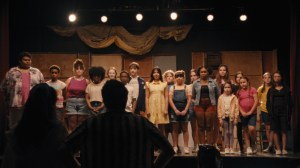
The cast of THEATER CAMP. Courtesy of Searchlight Pictures. © 2023 20th Century Studios All Rights Reserved.
whole camp at risk. He fires some long-time teachers operating on austerity mode. And when the financial vultures start circling the camp, trying for a cheap buy-out, things look dire. Even Amos and Rebecca-Diane’s show looks like it might not make it through the summer. Is this the end of Theatre Camp?
Theatre Camp is a delightfully squirmy, clever and hilarious mockumentary about acting. It’s suitably diverse, reflecting the actual live New York theatre scene. The fake doc follows the young players through auditions, casting, rehearsals, and behind-the-scenes action, through to the final production. Obviously these kids have talent — and so do the grownup kids. They manage to act as if they are actors who are acting… which isn’t as easy as it sounds. It’s full of surprises and unexpected oddities — like, this is a musical where Ben Platt doesn’t sing a note. I was laughing through most of it, and if a moviegoer like me can appreciate it, avid playgoers will go wild. The Toronto cast of HadesTown was sitting in my row at the advanced screening on Monday night, and they were whooping it up the entire time. If you like “Theatre”, you’ll love Theatre Camp.
 Afire
Afire
Dir: Christian Petzold
It’s summertime in northern Germany. Felix (Langston Uibel) and Leon (Thomas Schubert) are best friends in their twenties spending a few weeks at Felix’s family’s summer home on the Baltic sea. It’s a beautiful place with a thatched roof, just a quick hike away from a sandy beach. Felix is friendly, fit and personable; he’s working on his photo portfolio to get into an arts program. Leon is a published author, trying to finish his second novel. He’s also a chunky, self loathing schlump, both brooding and frustrated. His inappropriately named novel — Club Sandwich —
is not coming together. And his publisher, Helmut (Matthias Brandt), is dropping by in a few days — what does Leon have to show him? Things get worse when they realize they’re sharing the house with an unknown visitor. Nadja (Paula Beer) is the daughter of a friend of Felix’s mother. She’s working at the ice cream stand in a nearby quaint village. Leon is smitten by her carefree beauty, but tongue-tied whenever he talks with her. Worse still he is kept awake each night by the sounds of Nadja and Devid (Enno Trebs) — the hunky lifeguard at the nearby beach — having loud sex in the  next room. And all of this is taking place as wildfires in the forests that surrounds the beach are igniting all around them, as prop planes futilely drop water bombs on the flames. Will Leon’s love be forever unrequited? Can he survive his wonderfully miserable summer vacation?
next room. And all of this is taking place as wildfires in the forests that surrounds the beach are igniting all around them, as prop planes futilely drop water bombs on the flames. Will Leon’s love be forever unrequited? Can he survive his wonderfully miserable summer vacation?
Afire is a comic drama about a self-centred writer and the people all around him. Like all of Petzold’s films, Afire is spare, precise and minimalist — he never includes a scene — not even a single line — that’s not crucial to the story he’s telling. I love that about him. He deals with very real issues and their potentially tragic consequences, but told almost like a fable. At the same time, he not afraid to make firm moral judgements but always in a humorous way. The tiny cast is excellent, as is the music and cinematography. I like this one a lot.
 Openheimer
Openheimer
Wri/Dir: Christopher Nolan
It’s the 1930s. J Robert Oppenheimer (Cillian Murphy) known as “Oppie” to his friends, is a researcher and scientist at Berkeley. With a distinguished background — he studied at Harvard, Cambridge and Göttingen — he has published crucial papers on physics and quantum mechanics that have changed scientific practices. He hangs out with activists at the University who are trying to unionize the teachers, and lend support to the Republicans in the Spanish Civil war, as fascism creeps across Europe. He also sympathizes with the plight of Jewish scientists in Nazi Germany (not only because his parents are German-Jewish immigrants). Originally from Manhattan, Oppie much prefers the wide- open spaces of New Mexico where his brother lives. His ultimate dream? To somehow combine his two great loves: science and the American southwest. His dream comes true during WWII when he is approached by Groves, a hard-ass army officer (Matt Damon), who wants to set up a top-secret lab. It’s goal? To create an atomic bomb before Germany does. Where? In Los Alamos, New Mexico. Oppenheimer brings in the top scientists to work on it: Feynman, Teller, Fermi, Bohr and many others, living in a jerry-built town in the middle of the desert. But as the prototype nears completion, theory turns to reality. By 1945, Germany has already surrendered, but the US government  needs to drop it somewhere to prove they have the ultimate weapon of mass destruction. How can Oppenheimer both create an atomic bomb and oppose the enormity its use would bring to the world?
needs to drop it somewhere to prove they have the ultimate weapon of mass destruction. How can Oppenheimer both create an atomic bomb and oppose the enormity its use would bring to the world?
Oppenheimer is an sweeping historical drama about the life of a conflicted scientific genius, his lovers, his accomplishments, and a government that turns against him. It covers three parts of his life: as a student and academic, at Los Alamos, and in the cold war/ McCarthy era that follows WWII. The first part concentrates on his life and work — the parties he attends, the women he sleeps with (Frances Pugh, Emily Blunt), and the leftist political meetings he goes to not as a communist but as a “fellow traveller”. The second part captures the tension, stress and claustrophobia of the Manhattan Project, culminating in the devastating atomic test at Trinity. The third part concentrates on his rivalry with Lewis Strauss a right- wing bureaucrat on the AEC, the Atomic Energy Commission (Robert Downey Jr) and a series of congressional appearances and secret trials Oppenheimer is subjected to. But as a Christopher Nolan film, it is expertly edited to include all three stages simultaneously, bouncing back and forth, while proceeding chronologically, throughout the picture. And punctuated, from the beginning, with incredible animated images of the devastating fireball an atomic weapon brings.
I’m not a fan of Christopher Nolan’s movies. They’re often overly complicated for no apparent reason, and clumsily including things like time travel dreams and memory. Dunkirk, another historical drama, was exciting but overly nationalistic in its slant. This one avoids almost all of these potential pitfalls, and manages to tell a three-hour, historical drama about science without boring the hell out of the audience. On the negative side, there are so many characters — 40-50 at my count — it’s hard to keep track of who’s  who. These are mainly cameos about famous people (Einstein, Niels Bohr, Truman) played by equally famous actors — Tom Conti, Kenneth Branagh, Gary Oldman, Casey Affleck, Rami Malek, to name just a few — who pop up for a few minutes then go away. And aside from the women Oppenheimer sleeps with, virtually everyone else in the movie (much like Dunkirk) is male. Even so, I think Oppenheimer is Nolan’s best film since Memento — it’s exciting, politically intriguing and visually stunning, from the vistas of horseback riding in a western desert, to the terrifying flames of the atomic weapon. It’s three hours long, but well worth the effort.
who. These are mainly cameos about famous people (Einstein, Niels Bohr, Truman) played by equally famous actors — Tom Conti, Kenneth Branagh, Gary Oldman, Casey Affleck, Rami Malek, to name just a few — who pop up for a few minutes then go away. And aside from the women Oppenheimer sleeps with, virtually everyone else in the movie (much like Dunkirk) is male. Even so, I think Oppenheimer is Nolan’s best film since Memento — it’s exciting, politically intriguing and visually stunning, from the vistas of horseback riding in a western desert, to the terrifying flames of the atomic weapon. It’s three hours long, but well worth the effort.
Afire is playing now; check your local listings. And Oppenheimer and Theatre Camp both open this weekend.
This is Daniel Garber at the Movies, each Saturday morning, on CIUT 89.5 FM and on my website, culturalmining.com.
The Rise and Fall of Female Celebrities: Films reviewed: The Eyes of Tammy Faye, France, Spencer
TIFF is almost over now, but there’s still one day left to see some films. And although there aren’t many famous people appearing on King St this year, there are a lot of movies about celebrities. How they rise to fame and how they are often brought down again by the voracious papparazzi-fueled press. So this week I’m looking at three TIFF movies — two biopics and one dramedy — about female celebrities who just want to be loved. There’s a newscaster in Paris who is part of the news; a princess in England who is part of the royals; and a televangelist who is the target of the mainstream press.
Dir: Michael Showalter
Tammy Faye (Jessica Chastaine) is a televangelist. Born in International Falls, Minn, a small town on the Canadian border, she is raised by a strict mother (Cherry Jones) who calls her a harlot. She is born again in a Pentecostal church where she is speaking in tongues at an early age. At bible college she meets her future husband, Jim Bakker (Andrew Garfield). He rejects the dour talk of sin and instead subscribes to a charismatic evangelism, one where all are welcome, regardless of belief or denomination. Wealth, not poverty, is desirable. Tammy loves his ideas and him. But she wears makeup and bright colours, and they end up in bed together and eventually married.
They are expelled from the school, but bounce back. Tammy makes an ugly little puppet out of a bubble bath container to attract kids to revival meetings. Their popularity takes off and before you know it, they’re regulars on Pat Robertson’s Christian TV show. They break away to form their own satellite-powered TV network, attracting viewers and followers worldwide — people who enthusiastically send tons of cash to keep the show going. Tammy’s songs hit the Christian music charts while Jim expands their financial holdings, opening theme parks and other ventures. Tammy and 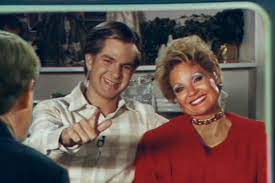 Jim love the wealth and luxury their show brings in — the mink coats and fancy homes. Their sex life, however, takes a dive. Neglected by her husband, Tammy is attracted to handsome men — and, so it seems, is Jim. She turns to Ativan and Diet Coke to keep her engine running. But they’re facing trouble. The mainstream press exposes scandal after scandal. And lurking in the background is the Christian Right, led by the notorious Jerry Fallwell (Vincent D’Onofrio). Can their marriage last? Will their financial empire stay afloat? Will Tammy’s mom ever respect her? And will the people always love her?
Jim love the wealth and luxury their show brings in — the mink coats and fancy homes. Their sex life, however, takes a dive. Neglected by her husband, Tammy is attracted to handsome men — and, so it seems, is Jim. She turns to Ativan and Diet Coke to keep her engine running. But they’re facing trouble. The mainstream press exposes scandal after scandal. And lurking in the background is the Christian Right, led by the notorious Jerry Fallwell (Vincent D’Onofrio). Can their marriage last? Will their financial empire stay afloat? Will Tammy’s mom ever respect her? And will the people always love her?
 The Eyes of Tammy Faye is a stylized, tongue-in-cheek biopic about the rise and fall of a televangelical superstar. The title refers both to her gaudy false eyelashes as well as the trademark tears she could generate on command. Jessica Chastain creates an unforgettable character through the use of facial prosthetics and heavy-duty makeup as she ages. She mainly plays Tammy for the laughs — there’s a wide streak of camp running through the whole film — but there is some heart behind it. And on the serious side, it points out her advocacy of AIDS patients, just when Falwell was publicly attacking them. I quite enjoyed the movie, it’s a lot of fun with tons of flashy colour and splashy music. It’s clearly Oscar bait — this is Jessica Chastain looking for golden statues — but that doesn’t detract from the enjoyment of watching it.
The Eyes of Tammy Faye is a stylized, tongue-in-cheek biopic about the rise and fall of a televangelical superstar. The title refers both to her gaudy false eyelashes as well as the trademark tears she could generate on command. Jessica Chastain creates an unforgettable character through the use of facial prosthetics and heavy-duty makeup as she ages. She mainly plays Tammy for the laughs — there’s a wide streak of camp running through the whole film — but there is some heart behind it. And on the serious side, it points out her advocacy of AIDS patients, just when Falwell was publicly attacking them. I quite enjoyed the movie, it’s a lot of fun with tons of flashy colour and splashy music. It’s clearly Oscar bait — this is Jessica Chastain looking for golden statues — but that doesn’t detract from the enjoyment of watching it.
Wri/Dir: Bruno Dumont
France de Meurs (Léa Seydoux) is a TV news reporter in Paris like none other. One day she’s flying off to a war front in the Sahel, the next she’s mediating between two political commentators. She’s beautiful, talented and loved by millions. At a presidential press conference she can upstage Macron. Her husband Fred is a novelist, and they live with their son Jojo in a flat thats more of an art museum than a home. And with the constant help of Lou (Blanche Gardin), her assistant and manager, she navigates from one success to the next. She’s untouchable. Until something throws her off kilter. Her car, caught in traffic, accidentally bumps a young man on a motorbike hurting his leg. Baptiste is working class, the son of Algerians. France is mortified and goes out of her way to visit his family, showering them with gifts. But a deep-down depression has taken hold.
Her self confidence is fading and she’s prone to breaking into tears at the first provocation. Fred finally sends her to an alpine spa to recover, where she meets a guileless young man named Charles (Emanuele Arioli) who has never heard of her. Is he the answer to her prayers? Or just her latest obstacle as she falls deeper and deeper into her abyss?
France is a satirical dramedy about France (the country) its politics, celebrities and news media. Like the 1987 film Broadcast News it exposes the falsity and contrivedness of the news industry — their posing, re-shooting of answers in interviews, and the staging of news scenes during a war. But just as the film exposes the tricks and manipulation of reporting, Bruno  Dumont (the filmmaker himself) relies on his own contrived story. Poor France! She’s subject to Dumont’s morbidly humorous plot turns, inflicting more and more calamities on his poor hapless character. France de Meurs is Dumont’s Job.
Dumont (the filmmaker himself) relies on his own contrived story. Poor France! She’s subject to Dumont’s morbidly humorous plot turns, inflicting more and more calamities on his poor hapless character. France de Meurs is Dumont’s Job.
The film kept me interested all the way through, and Lea Seydoux is really good in her role as a manipulative but likeable celebrity, but it goes on way too long — one of those movies that feel like they’re about to end, but don’t.
Dir: Pablo Larraín
It’s Christmas Eve in 1990.
Princess Diana (Kristen Stewart) is late for lunch. She’s driving to Sandringham Castle and and has lost her way. She grew up on a country home nearby. Eventually she is rescued by Darren the palace chef (Sean Harris) who runs his kitchen like a military battalion. But Diana doesn’t want to be there. She hates the weird family traditions she’s forced to follow. Things like sitting on a scale when you enter to see how many pounds you’ll gain feasting over Christmas. Not much fun for someone with Bulimia. She dreads the clothes and jewels she’s forced to wear, and can’t stand the family dinners — she thinks the royals can all read her mind. Her only allies are her young sons William and Harry, with whom she can act like a normal mom; and her dresser and confident Maggie (Sally Hawkins) whom she can tell anything.
Why is she so distraught? Because she knows her husband is having an affair. The constant hounding by the dreaded cameramen is deadly, but even worse are the palace rules, enforced by a cryptic royal military officer. Major Alistar Gregory (Timothy Spall) feels it’s his duty to police everything she does — and she despises him for it. He sews her curtains shut — to stop the photographers, he says — and banishes Maggie from the castle. And as the three days around Christmas come to pass, her depression and anger makes way for paranoid delusions. Is she a princess or a prisoner? And can she ever get away from this 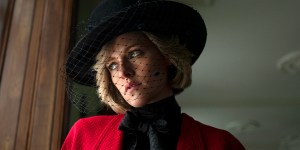 awful, gilded life?
awful, gilded life?
Spencer is an experimental film that looks at three days of Diana’s life, her last ones spent as a member of the royal family. It’s beautifully done, but in a highly interpretive way. She is constantly haunted by the ghost of Anne Boleyn who was killed by Henry VIII. She seeks solace in a scarecrow she finds on her father’s estate next door. And her dreams, fantasies and realities start to blend. This is a beautiful movie, marvellously made. At certain angles Kristen Stewart does look like Diana, but this is really a fictional interpretation of the character she creates. She doesn’t try too hard to match her class and accent, just her thoughts and mood. If you’re a stickler for historical accuracy and stodgy characters, this one’s not for you. But if you approach it instead as an experimental and surreal character-study of a troubled woman, I think you’ll love it like I do
All three of these movies played at TIFF. Spencer opens in November, The Eyes of Tammy Faye starts this weekend — check your local listings.
This is Daniel Garber at the Movies, each Saturday morning, on CIUT 89.5 FM and on my website, culturalmining.com
Films reviewed: Swan Song, Beyond Monet, Respect
Hi, this is Daniel Garber at the Movies for culturalmining.com and CIUT 89.5 FM.
With the end of lockdowns finally reaching Toronto, people are itching to catch up on what they’ve been missing — from getting their hair cut, going to an art gallery, or listening to a concert on the big screen. This week I’m looking at two movies and one experience. There’s soul in Detroit, hairdressing in Ohio, and French impressionism in downtown Toronto.
Wri/Dir: Todd Stephens
Pat Pitsenbarger (Udo Kier) was once known as the Liberace of Sandusky Ohio, known for his gaudy jewelry, his pastel pantsuits and his flamboyant style. The richest women in town flocked to his hair salon where he could accomplish miracles with just his fingertips and a can of hairspray. But now he’s long-forgotten, a penniless old man living in a nursing home with puke-green walls and fluorescent lights. What happened?
His protege Dee Dee (Jennifer Coolidge) opened up a larger salon across the street from his, poaching his longest clients, including Rita Sloan a millionaire and his oldest patron. Then his lover David died of AIDS. And since this was before same-sex marriage, their shared house was inherited by a distant relative, leaving him homeless. So for Pat, Sandusky is just history. Until a lawyer named Mr Shamrock arrives at his room with a new development. Rita has died, and in her will she insists Pat be the one to style her hair in her coffin. And if he does he’ll inherit  25,000 clams. So Pat sets out on a long journey back to long-lost Sandusky, encountering strange people and places along the way. Will he get there in time for Rita’s swan song? And can he finish the job without any beauty supplies?
25,000 clams. So Pat sets out on a long journey back to long-lost Sandusky, encountering strange people and places along the way. Will he get there in time for Rita’s swan song? And can he finish the job without any beauty supplies?
Swan Song is a very gentle, low-key, and slow- moving homage to the gradually fading world of small town gay life in America. Though nostalgic, it doesn’t present a white-washed version. It features Pat (loosely based on a real person) as an inveterate shoplifter, Eunice his best friend who is known for loitering in public toilets, as well as the seedy gay bar where they used to lip-synch torch songs. Udo Kier, the great German actor, has fun with his role, injecting his own trademark campiness. Swan Song is a cute and gentle, (though too slow-moving) LGBT comedy.
Claude Monet was a fin-de-siècle French painter who daubed his canvases with bright spring colours. Critics at the time referred to his work derisively as impressionism, thus providing a name for the movement. But as his fame grew, his eyesight faded, and by the end his works veered to the nearly abstract. Today, though, his paintings of fields, gardens, water and most of all waterlilies are among the most famous of that era. Beyond Monet is an exhibition, not of his art, but rather an immersive experience. His works are projected on a circular, 360 degree wall and ceiling, about the size of a football stadium. The works themselves are constantly rising, falling, or gradually turning around inside the exhibition space, so you can see all of it without moving from your area. It’s constructed around a large wooden cupola in the centre, along with shiny, round landing pads spread all around to sit on. The images are softly animated: waves in his paintings rise and fall; in his winter scenes, snow seems to blow against the landscapes, while flowers and lillies bloom before your eyes. And a constantly-shifting — and at times quite lovely — original soundtrack of music and sound effects (like birds, crickets or waves) adds to the mood.
The exhibition is in three parts. The first consists 0f a few curved wooden bridges and some gossamer sheets hanging from the tall ceilings. It also has a series of bilingual signs explain the art. You pass through a hallway festooned with cheap mylar strips, into the main room where the actual show takes place.
Is seeing an original canvas by Monet the same as a projection, however well-rendered and animated, in a large space? No… not even close. This isn’t art, it’s about art. It reminds me of those parks with miniature versions of the Eiffel tower and the Taj Mahal.
What it is, though, is a pleasantly relaxing experience for those who want to appreciate Monet without the trouble of seeing his actual stuff. Interestingly, the entrance features an assortment of empty wooden canvas frames, to remind us, I suppose, that the real art is still on museum walls. But with the pandemic on, perhaps Beyond Monet is a way to get the feeling of his work without travelling far. And the show is well- ventilated, well-spaced and with a limited number of guests at any one time.
Dir: Liesl Tommy
It’s 1952. 10-year-old Aretha Franklin, known as “Ree”, lives in a middle class Detroit neighbourhood. Her father (Forest Whitaker) is a firebrand baptist preacher with a huge congregation. He is a colleague of the Rev Dr Martin Luther King, who Ree calls Uncle Martin. He holds Saturday night get-togethers where little Ree is the featured performer in a musical household. Still a child, she has the voice of a full-grown woman, and performs be-bop and scat singing, not just gospel. Her father intends to make her a star. By the late 50s he gets Aretha (Jennifer Hudson) signed with John Hammond at Columbia Records where she records old jazz standards with a full orchestra. But without any hits.
Then everything changes in the late 60s when she is taken under the wing of producer Jerry Wexler at Atlantic, the man who coined the term Rhythm and Blues. He introduces her to the back-up players at Muscle Shoals, men who know how to feel the music. Aretha brings in her sisters as back up singers, and 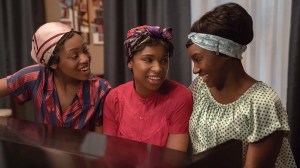 the rest is history. She becomes the queen of soul and her songs internationally famous.
the rest is history. She becomes the queen of soul and her songs internationally famous.
This music biopic follows her career over a 20 year period, from 1952 to 1972. And it’s not a smooth and steady ride. It’s called Respect partly because of her hit single but also to point out the lack of it she experiences from both her domineering father and her tempestuous relationship with the often violent and manipulative Ted (Marlon Wayans) her sometime husband and manager. It also exposes the harsh underbelly of her stable, middle-class life. She is raped at an early age (this is implied not shown) and gives birth to a number of sons while still in her teens (her grandma takes care of them.) Her father says she has “demons” inside, but maybe it’s just her trying to break free, whether through her music or alcoholism, from the relentless disrespect and physical and mental abuse she suffers for much of her young life.
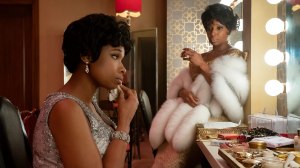 Respect is part performance, part melodrama, alternating between a near constant flow of music interspersed with re-enactments with her family, business, and love life. We see her ups and downs (mainly her downs), along with many — maybe too many — fights, tantrums and meltdowns. Biopics have two choices: either hire great actors with mediocre or dubbed voices, or great singers. Hudson is the latter. She has a fantastic voice, featured here in so many genres — gospel, jazz, soul and pop — which holds the movie together. The melodramatic scenes are a mixed bag, some very moving, others cringe-worthy. Whitaker is really good as CL Frankin, and Hudson is in nearly every scene. While Respect is not a great movie, I greatly enjoyed watching it.
Respect is part performance, part melodrama, alternating between a near constant flow of music interspersed with re-enactments with her family, business, and love life. We see her ups and downs (mainly her downs), along with many — maybe too many — fights, tantrums and meltdowns. Biopics have two choices: either hire great actors with mediocre or dubbed voices, or great singers. Hudson is the latter. She has a fantastic voice, featured here in so many genres — gospel, jazz, soul and pop — which holds the movie together. The melodramatic scenes are a mixed bag, some very moving, others cringe-worthy. Whitaker is really good as CL Frankin, and Hudson is in nearly every scene. While Respect is not a great movie, I greatly enjoyed watching it.
Look for Swan Song on VOD and digital formats. Respect opens theatrically in Toronto this weekend — check your local listings. And Beyond Monet is exclusively showing at the Metro Toronto Convention Centre now.
This is Daniel Garber at the Movies, each Saturday morning, on CIUT 89.5 FM and on my website, culturalmining.com
Daniel Garber talks with immigration attorney Judy Wood about the new biopic Saint Judy
 Hi, this is Daniel Garber at the Movies for culturalmining.com and CIUT 89.5 FM.
Hi, this is Daniel Garber at the Movies for culturalmining.com and CIUT 89.5 FM.
It’s the early 2000s in L.A. Judy Wood (Michelle Monaghan), an immigration lawyer and single mom, discovers a shocking case. A young woman – a school teacher who defied Taliban oppression in Afghanistan – is incarcerated in California awaiting deportation. But sending her back to her home village would be like a death sentence. Why isn’t she considered a refugee? Trouble is women are not a minority group, and her religion, language and nationality – Muslim and Pashtun – are the same as her oppressors. Which means she’s not a “persecuted minority” and doesn’t 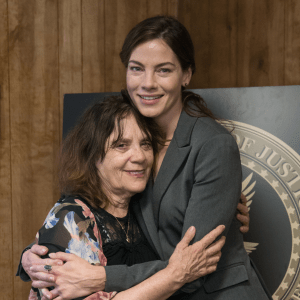 qualify for asylum. What can she do?
qualify for asylum. What can she do?
Saint Judy is a new biopic based on real events that tells the story of this important trial. It centres on Judy Wood, an immigration lawyer – still practising in LA – who changed the Law of Asylum.
I spoke to Judy in Los Angeles via telephone from CIUT 89.5 FM in Toronto.
Saint Judy has its Canadian Premier on Thursday, June 20 in Oakville, and its Toronto VOD launch on Friday, June 21 at the Revue Cinema in a benefit for Sistering. Judy Wood will appear in panel discussionsat both screenings.
 Do you have hankering for some good European movies? Well, you can see two movies a night — from Cyprus to Finland, from Bulgaria to Ireland — at the European Union Film Festival, on right now through Nov 30th. The films are showing at the
Do you have hankering for some good European movies? Well, you can see two movies a night — from Cyprus to Finland, from Bulgaria to Ireland — at the European Union Film Festival, on right now through Nov 30th. The films are showing at the  Next Goal Wins!
Next Goal Wins! Samoan culture, so it’s hard to get the team back together again. Third, all the players are quirky in their own way. Can Thomas build back team spirit? Or is that one goal just a pipe dream?
Samoan culture, so it’s hard to get the team back together again. Third, all the players are quirky in their own way. Can Thomas build back team spirit? Or is that one goal just a pipe dream? the team is a fa’afafine — someone of a third gender. There’s also a reluctant goalie, a local multi-talented newscaster, and a host of others. Very cute. Problem is this film is so light you could blow it out of the room if you sneeze. There are a lot of chuckles, but the plot is strictly paint-by-numbers — I’ve seen it so many times already. This is Taika Waititi who brought us Jojo Rabbit and
the team is a fa’afafine — someone of a third gender. There’s also a reluctant goalie, a local multi-talented newscaster, and a host of others. Very cute. Problem is this film is so light you could blow it out of the room if you sneeze. There are a lot of chuckles, but the plot is strictly paint-by-numbers — I’ve seen it so many times already. This is Taika Waititi who brought us Jojo Rabbit and  May / December
May / December button topic, with strangers, even now, sending obscene or abusive packages in the mail. The question remains: Were they a naive couple madly in love? Or was Joe a victim, exploited by a much older woman? And will Elizabeth (the actress) tell their story the way they want it told, or the way she wants to tell it?
button topic, with strangers, even now, sending obscene or abusive packages in the mail. The question remains: Were they a naive couple madly in love? Or was Joe a victim, exploited by a much older woman? And will Elizabeth (the actress) tell their story the way they want it told, or the way she wants to tell it? stereotypical Hollywood actor:
stereotypical Hollywood actor: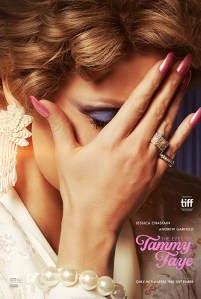


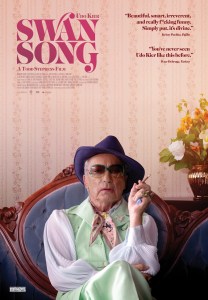

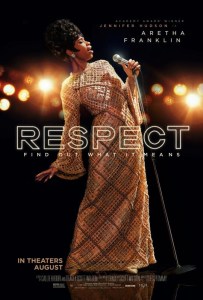
leave a comment